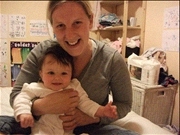Tutor HuntResources Maths Resources
Born With A Maths Brain - Power Or Poison?
An article about whether being good at maths is a matter of nature or nurture.
Date : 06/09/2013
Is talent inborn? The belief that it is forms the backbone behind fears of inadequacy in areas of music, sport and a common area of struggle, Maths. If we believe that talent for these areas is with certain people from the birth, it is so much easier to write ourselves off when it comes to improving ourselves in our weak areas. "I do not have a Maths brain," is often my damning conclusion spoken silently, which ends my efforts to improve in Maths before I have even begun.
With 5 weeks to go before I start a training course for the PGCE Primary I am still plagued with the fear that I will be unable to give the children what they need in regards to Maths teaching. Will they ask questions I cannot answer? Will they know more maths than me? Have I gotten myself into something in which I will be completely humiliated? These fear-loaded questions prompted me to do some research into a belief that I think I am not alone in..... "I just don't have a Maths brain,"
Recently I discovered an article outlining the five myths about Maths and I realised that I subconsciously believe every one of them. This was an illuminating experience for me as it made me call into question the very basis for my self-belief when it comes to Mathematics. If my core beliefs about Maths are based on myths then this means that what is accessible to me is in an entirely new undiscovered perspective on my Mathematical abilities.
So why is the belief that talent is inborn so tempting? First of all, it is the path of least resistance. From personal experience, I know that it is a lot easier to take a defeatist approach and claim that the things we find difficult will never come easily to us and so there is no point in trying. Secondly it gives us an easy and neat answer to understanding the difference between ourselves and those we put on a pedestal. Finally the belief that talent is inborn can empower us. Individuals that find Maths much easier than other people can be forgiven for thinking that it is a natural part of their brain, as these thoughts make people feel powerful, unique, confident and special. Song writing has the same effect on me. It is tempting to think of it as a gift because it makes me feel special, but I could be wrong. I was brought up from an extremely young age surrounded my music and during my teen years I spent hours singing and song writing and I improved because of it.
So what does this leave us with? We know that believing some people are just naturally better at maths, can be very unhelpful, because in so many people it can force a belief that there is no possible place for improvement. Here we come to the million dollar question, is there any scientific proof that people are born with a talent for maths?
One line of research suggests not. Brian Butterworth, a respected researcher and writer on the topic maintains that an affinity with maths is more likely down to interest and hard work. People can be obsessively interested in maths, have a lot of access to maths through family members, or experience really good teaching and work incredibly hard to achieve success, but there is no proof that the make-up of the brain is linked to aptitude.
In recent publications Butterworth refers to the existence of an area of the brain just above the left ear (the parietal lobe), that he calls the the 'number module'. This physical knot of cells, he says, enables us to an awareness of numbers and an instinct to quantify "count" things. Importantly however, Butterworth stresses that this does not mean that there is necessarily a connection between an enlarged or dense 'number module' and an aptitude for maths. Einstein was found to have a particularly dense-celled parietal lobule but Butterworth suggests that this is due to his working that particular area of the brain harder. What a boost of hope to those of use that struggle with certain subjects if this is the case.
In conclusion I would like you to reflect upon a final thought. That even with years of research, we are far from understanding whether abilities, (in this case, Mathematical aptitude), is in-built into our brains. It is very worthwhile to consider that we may be able to build a strength or even a talent for a particular subject if we are happy to put in the hard work.
This resource was uploaded by: Ruth

